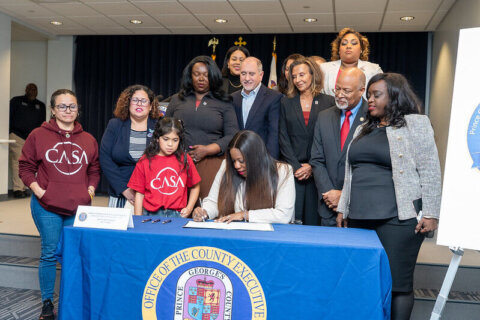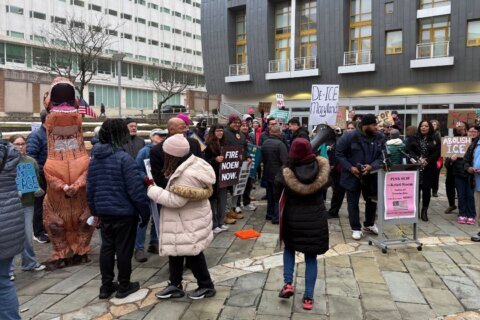The Prince George’s County Council unanimously approved the creation of a new rental assistance program on Tuesday.
No one from the public spoke out against the program, and no one from the council did either. Instead, the looming fight appears to be over how to fund it.
Under the legislation, residents are eligible for assistance worth up to 20% of their monthly rent, six times over a two-year period. Priority will be given to residents whose rents went up by at least 15% since last summer. The amount of assistance available is income-based, and only for rental properties.
“This rental assistance program is part of this conversation that we have to have about affordable housing,” said council member Krystal Oriadha, one of the lead sponsors of the bill.
“These aren’t people asking for handouts,” she said. “These are people that work harder than every single person on this dais. Every single person on this dais, they work harder than them, every single day, and can’t survive. People can’t be OK with that.”
But even with a 10-to-0 vote in favor of the measure, she also acknowledged passing the bill creating the program was the easy part. Coming up with the money won’t be.
“It is so important that our budget aligns with our morals. I don’t believe anything a politician says if I don’t see it in the budget,” said Oriadha.
Her colleague, council member Sidney Harrison, voted to create the program, but also warned it’s going to force tough choices on the council.
Harrison noted that 84% of the county’s budget is devoted to education and public safety, and that 81% of the education budget is used to pay for school staffing. In addition, the county is tasked with coming up with another $150 million mandated by Maryland to cover costs associated with the Blueprint for Education and stormwater management.
Harrison also said 72% of the county’s budget is paid for by residential property owners, with the other 28% coming from commercial revenue. In neighboring Montgomery County, the ratio is nearly the opposite.
For that reason, he said it might be time to take a fresh look at the fee structure in the county and what else can be done to expand the county’s tax base.
“Our funding formula is broken, and we must find a way to expand our tax base to pay for the things that would actually be a great help to the citizens of this county,” said Harrison. “Right now, we can all admit that the funds that we have are very, very limited. All of us should be thinking about ways to bring more revenue into our county so we can improve the services we have here.”
The council’s vice chair, Wala Blegay, said that if the county doesn’t pay now, it’ll end up paying later.
“If you continue to have people being evicted, people do not have resources, what happens is that at one point we start to see an even bigger uptick in crime, and some of the concerns that people have,” said Blegay.
She said the money spent on boosting police and incarceration costs money too.
“Either we make the steps that make sure we don’t have mass evictions in Prince George’s County or you’re going to see homeless people on your street,” said Blegay. “You’re going to be complaining about the crime, you’re going to be complaining about the litter from mass evictions of putting people’s property on the street. What do we want to pay for?”








